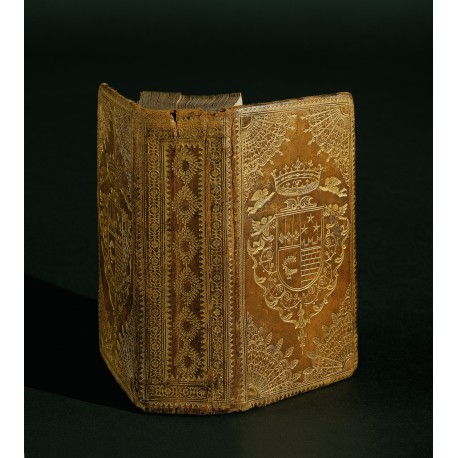 View larger
View larger
I veri trattenimenti ò Discorsi spirituali… tradotti dal Franzese nell Italiano da D. Paolo Battista Vso di Mare
- Subjects
- Bookbinding - Italy, 1601-1700 - Andreoli (Giovanni), 1631-1699
- Bookbinding - Italy, 1601-1700 - Andreoli (Gregorio), active 17th century
- Authors/Creators
- Francis de Sales, Saint, 1567-1622
- Printers/Publishers
- Cavalli, Francesco, active 1627-1657
- Owners
- Pamphili, Olimpia Maidalchini, 1594-1656
- Other names
- Andreoli, Giovanni, 1631-1699
- Andreoli, Gregorio, active 17th century
- Usodimare, Paolo Battista, OSB, active 1652
Francis de Sales, Saint
Thorens (Duchy of Savoy) 1567 – 1622 Lyon
I veri trattenimenti ò Discorsi spirituali… tradotti dal Franzese nell Italiano da D. Paolo Battista Vso di Mare.
Rome, Francesco Cavalli, 1652
duodecimo (140 × 75 mm), (228) ff. signed a12 A–S12 (blanks S11, S12) and paginated (24) 1–411 (21). Engraved portrait printed on folio a3.
provenance Olimpia Maidalchini-Pamphilj (1594–1657), binding — Christie’s, ‘Libri, autografi e stampe’, Rome, 14 December 1999, lot 125
Text lightly foxed; slight abrasion to edges of the binding, headcap chipped, other minor defects, but overall a good copy in entirely original state of preservation.
binding contemporary Italian calf binding, covers and back elaborately decorated in gilt, armorial insignia on covers of Olimpia Maidalchini-Pamphilj; page edges gilt.
First edition in Italian translation of Les Vrays Entretiens spirituels, a series of twenty-one lectures (or Conferences) on the duties and virtues of the conventual life delivered to the Nuns of the Visitation by François de Sales, later written up from memory by his listeners, and published in an authorised edition at Lyon in 1629.1 The translator, Paolo Battista Uso di Mare, a Benedictine monk of the Cassinese congregation in the Basilica of San Paolo fuori di Mura in Rome, dedicates the edition to Cardinal Fabio Chigi, at whose instigation it was made.
This copy was bound for Olimpia Maidalchini-Pamphilj (1594–1657), the most powerful woman in Rome of her day. First married to Paolo Nini, Olimpia contracted a second marriage with Pope Innocent x’s elder brother Pamphilo Pamphilj, to whom she bore a son, Camillo, in 1622. She became the confidant of Innocent x and received enormous riches during his pontificate, including magnificent works of art. Innocent’s successor, Alexander vii, exiled her in 1655 to her palace in San Martino al Cimino, a small village north of Rome, where she died two years later.
Our binding is decorated by tools associated with a shop once designated the ‘Rospigliosi Bindery’ on account of the work it undertook (directly and on behalf of donors) for Giulio Rospigliosi as Cardinal and as Pope Clement ix (1667–1669).2 From about 1656, the shop worked continuously for the Biblioteca Vaticana. Recent scholarship has identified its proprietors as the brothers Gregorio (died 1696) and Giovanni Andreoli (died 1699).3 Another Roman shop (the so-called ‘Enigmatic Binder’) employed very similar tools, including the two cherubs supporting the shield, and the roll decorating the back of our binding. On present knowledge it is impossible to separate their production.4
Two bindings displaying Olimpia’s insignia were featured in the exhibition Legatura Romana Barocca, one (no. 49) executed in vellum on a quarto Officio del Patriarca S. Domenico (Rome 1644), the other (no. 59) in calf on a quarto manuscript ‘cartella vuota’ (undated). Neither binding is as ornate as ours, nor decorated by the same group of tools. The ‘Enigmatic Binder’ bound for Pope Alexander vii in a similar style Francis de Sales’ Introduzione alla vera divotione (Rome 1651).5
Four copies of this first edition can be located, all in Italian libraries
● Biella, Biblioteca diocesana del Seminario vescovile, A.8.111 ● Genoa, Biblioteca provinciale dei Cappuccini liguri, 1CHISPA XX0 70 ● Foligno, Biblioteca L. Jacobilli del Seminario Vescovile, FA Seic.159 ● Rome, Biblioteca Vallicelliana, S.BOR A.IV.91
1. Oeuvres de Saint François de Sales, edited by Dom Benedict Mackey osb (Annecy 1895), vi, pp.xxii–xxvi.
2. See Mirjam Foot, ‘The Borghese Bindery, the Rospigliosi Bindery and their Patrons’ in The Henry Davis Gift: a collection of bookbindings. Volume i: Studies in the history of bookbindings (London 1978), pp.323–336.
3. Several hundred tools associated with the Andreoli workshop are reproduced in Legatura Romana Barocca 1565–1700, exhibition catalogue, Palazzo Braschi (Rome 1991), pp.31–46, plates v–vii.
4. Guido Vianini Tolomei, ‘Un atelier de reliure à Rome au xviie siècle; l’atelier dit Enigmatique’ in Bulletin du Bibliophile 1993, no. 2, pp.322–344.
5. Vianini Tolomei, op. cit., no. 17 (reproduced p.326).



